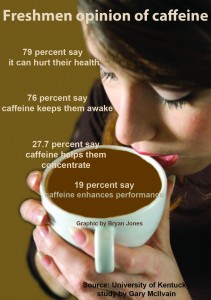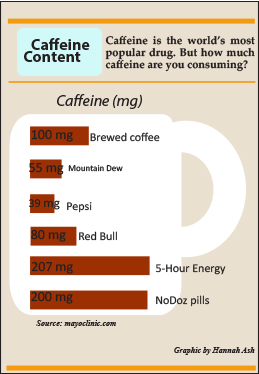Michael McKean, computer sciences junior, said he would not be able to get through his busy day without the help of caffeine.
The 31-year-old said he struggles to find enough time for all of his responsibilities. Between working full-time, going to school part-time and spending time with his wife and two young sons, McKean said he relies on caffeine to keep him going.
“Waking up at 4 o’clock in the morning is quite difficult,” McKean said. “Caffeine gives you that little pump you need in the morning — it has just become a habit.”
McKean said that he considers himself a caffeine addict and that on any given day he drinks up to two energy drinks and five cans of Mountain Dew.
McKean is not alone. According to a report from the Johns Hopkins School of Medicine, 90 percent of Americans regularly use caffeine, and the average adult consumes about 280 milligrams of caffeine daily.
According to the Mayo Clinic, a worldwide, nonprofit medical organization, adults should consume no more than 300 milligrams of caffeine a day. Some however find it to be difficult to keep track of how much caffeine they are drinking.
The Food and Drug Administration does not require the amount of caffeine in a beverage to be listed on the label because caffeine is not considered a nutrient.
However, according to the FDA, investigations of 30 different manufacturers are under way to look into the safety of certain alcoholic drinks containing caffeine such as Four Loko.
The FDA also gathered and published incident reports relating to 5-Hour Energy shots, Monster energy drinks and Rockstar energy drinks addressing recent reports of deaths linked to caffeinated beverages.
Michelle Smith, a dietician at the Floyd County Health Department, said that when dealing with patients it works better to give exact numbers.
“Three-hundred milligrams of caffeine doesn’t really mean anything to the average person,” Smith said. “Nobody is going to count numbers. I usually say limit yourself to one 12-ounce soda or one cup of coffee and to stay away from the Monsters and the Red Bull.”
Smith also said that even when caffeinated drinks list the caffeine content the numbers can be incorrect.
Rob Hawks, public speaking sophomore, is a self-confessed caffeine addict. He said he usually drinks six to eight cans of Pepsi per day.
“I think college students really rely on caffeine as a means to keep them awake during finals,” Hawks said. “It helps pull off the all-nighters, and almost every student needs that at some point.”
Another self-confessed caffeine addict, Jade Veirs, biology freshman, said she typically drinks about three pots of coffee a day, but she drinks more caffeine to get through exams.
“I’ll add some Monsters,” Veirs said. “Coffee doesn’t wake me up anymore, but Monsters will help keep me awake.”
“With the schedules that most students have, they have to be powered by something to get through,” Veirs said.
According to the Mayo Clinic, consuming more than 500 milligrams of caffeine could cause side effects such as muscle tremors, nervousness, fast heartbeat and upset stomach.
McKean said he is familiar with some of the negative side effects of caffeine. McKean said once he was making a four-hour drive to Ohio after work, and was trying to stay awake. He said he stopped at a gas station to get something caffeinated.
McKean said he decided to buy a Red Bull energy drink and a 5-Hour Energy shot.
“I do not recommend mixing a 5-Hour Energy with a Red Bull,” McKean said. “That’s caffeine overload. It goes way beyond that right amount of caffeine for me, and it made me feel really sick.”
Smith said that while the short-term side effects of caffeine are unpleasant, there are also unpleasant long-term side effects of prolonged caffeine use.
Smith said that the long-term side effects can include high blood pressure, anxiety, heart disease and irregular sleep patterns.
Smith also said that caffeinated drinks can be dangerous because caffeine is dehydrating.
“People think they are getting their fluids with soda and energy drinks, but they aren’t,” she said.
Smith said that people using caffeine before exercising should be especially careful to drink extra fluids to offset the dehydrating effects of caffeine.
Veirs, McKean and Hawks all said that they notice withdrawal symptoms if they go without caffeine.
“I get headaches if I don’t have any or if I have very little, which is quite annoying,” McKean said.
Veirs said that without caffeine, she feels less focused and cranky.
According to the Johns Hopkins School of Medicine, signs of caffeine withdrawal can include difficulty concentrating, irritability, depression, anxiety or flu-like symptoms.
According to the Mayo Clinic, if people plan to cut back on caffeine, they should reduce their intake gradually to help reduce withdrawal symptoms.
McKean said his wife would like him to cut back on the amount of caffeine he drinks, but McKean said he has no immediate plans to.
He said he relies on caffeine too much to get him through the day.
“Caffeine is popular because the way our society is go-go-go,” McKean said. “It’s one of the only legal ways to keep our bodies going.”
By HANNAH ASH
Staff
hash@ius.edu



